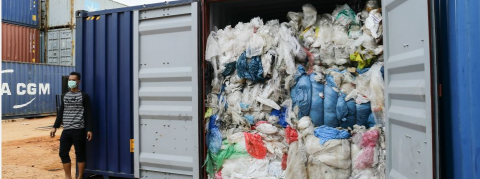EU Moves to Ban Certain Plastic Waste Exports to Poor Nations

https://news.bloomberglaw.com/environment-and-energy/eu-moves-to-ban-cer...
The European Union plans to go further than an international treaty in restricting exports of plastic waste, potentially spelling problems for the bloc in dealing with hard-to-recycle material.
The European Commission, the EU’s executive arm, is calling for comments through July 22 on a draft law that would implement the latest updates to the United Nations Basel Convention.
Updates to the treaty—formally known as the Basel Convention on the Control of Transboundary Movements of Hazardous Wastes and Their Disposal—were approved in May 2019. They require countries that export mixed or contaminated plastic waste to obtain prior informed consent from importing countries.
The changes, which take effect Jan. 1, are intended to give poorer countries the right to refuse waste shipments that can end up being poorly managed and can harm people’s health and the environment.
The EU’s proposal would go further than the Basel Convention updates by only allowing exports of mixed or potentially contaminated plastic waste to Organization for Economic Cooperation and Development (OECD) countries, based on their prior informed consent.
The ban on shipping outside the OECD would apply most to low-grade mixed plastic waste, which can contain harmful chemicals, when “we don’t know if it’s safe to be shipped or not,” Pierre Condamine, waste policy officer with the group Zero Waste Europe, told Bloomberg Law in an interview.
More Waste To Manage
A consequence of the new limits would be “an increase in plastic waste that will have to be treated in Europe,” said an adviser at a recycling industry group who asked not to be named, citing the sensitivity of the issue.
Europe has the capacity to recycle more plastic, but ineffective waste separation and sorting schemes mean much plastic, especially household waste, is contaminated and unrecyclable, the adviser said.
Coronavirus-caused lockdowns and shelter-in-place mandates have caused a boom in volumes of household waste, which is typically low-grade and mixed, and a reduction in better-quality industrial and pre-consumer waste streams, the adviser added.
Though capacity exists, “the market for recycling in Europe is not competitive compared to virgin plastic” because of low oil prices, Condamine said.
The consequence of prohibiting exports of low-grade waste outside the OECD, plus market factors, would likely mean more waste incineration in Europe, he said.
Sort It Better
The European Commission has promised to propose ways to better separate and sort waste, as part of a circular economy strategy published in March. But those proposals wouldn’t be made until 2022, according to the strategy.
The updates to the Basel Convention have already triggered redirection of EU waste shipments away from Southeast Asia to Turkey, which is an OECD member, Condamine said.
China banned imports of most plastic waste in 2018. Other Asian countries have also enacted limits or turned away shipments.
“The Basel amendment will function as a welcomed, and important, incentive for the EU member states to improve domestic circular economy strategies for plastic,” Marianne Kettunen, principal policy analyst at the Institute for European Environmental Policy, said in an email.
Quality Waste
The new draft EU rule would allow export of plastic waste to any country that wants it—if that waste is destined for recycling and is “almost free from contamination and other types of waste.”
This could present a loophole because there’s “no guidance on what ‘almost free’ entails, both in relation to chemical contamination and in relation to being mixed with other types of waste,” Sara Brosché, science adviser with the International Pollutants Elimination Network, said in an email.
The EU had no plans to enact short-term measures to aid plastic waste treatment, ahead of already planned steps such as the 2022 proposals on waste separation, European Commission spokeswoman Vivian Loonela said in an email.
EU plastic waste exports fell from 3 million metric tons in 2016 to 1.9 million metric tons in 2019 after the Chinese import ban, and EU policy was that “waste generated in the EU should be treated and recycled in the EU,” Loonela said.
Like the Basel Convention updates, the EU rule on waste exports would apply from Jan. 1.
To contact the reporter on this story: Stephen Gardner in Brussels at correspondents@bloomberglaw.com
To contact the editors responsible for this story: Gregory Henderson at ghenderson@bloombergindustry.com; Rebecca Baker at rbaker@bloombergindustry.com
https://news.bloomberglaw.com/environment-and-energy/eu-moves-to-ban-cer...
